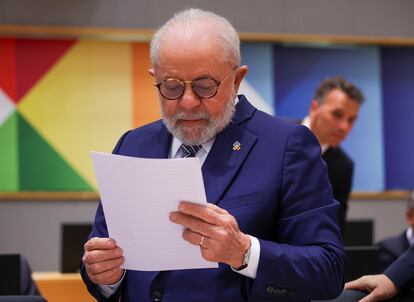Lula da Silva: ‘I have rarely seen so much political and economic interest from the EU countries towards Latin America’
The Brazilian president believes that the EU-CELAC summit held in Brussels was ‘extremely successful’


Brazilian President Luiz Inácio Lula da Silva returns to his country convinced that the EU-CELAC (Community of Latin American and Caribbean States) summit held this Monday and Tuesday was “extremely successful.” “Of all the meetings in which I’ve participated with the EU, this has been the most successful of all,” said the politician. Lula is clear about the reason: “I have rarely seen so much political and economic interest from the EU countries towards Latin America.”
The appreciation of the president of Brazil, the main political and economic player in the region, leaves no doubt about the outcome of the summit. Nor is the Brazilian deceived about what took Europe from a very recent apathy to an utmost interest in the region: “Possibly due to the dispute between the United States and China, possibly due to China’s investments in Africa and Latin America, possibly due to the new Silk Road [the Chinese investment program], possibly due to the war [in Ukraine].” Regardless, Lula recognizes the concrete result: “The European Union showed great interest in investing by announcing an investment of €45 billion [$50.2 billion].”
At the beginning of the summit, the Brazilian (in office between 2003 and 2011 and again since last January) had issued a blunt warning: neither he nor the other Latin American leaders — particularly the Argentine Alberto Fernández — were willing to allow past situations, “extractivist logics” that only seek raw materials from the region without taking into account its development. And based on what was said early this Wednesday in his assessment of the event before the press, Lula was satisfied with the result, noting that the EU also promised “to help finance $100 billion to fight the deforestation of the jungle, be it the Amazon or another jungle.”
The result is positive for the Brazilian leader, to the point that he is also “very optimistic” about the possibility that the ratification of the trade agreement between the EU and Mercosur (an economic bloc made up of Brazil, Argentina, Uruguay and Paraguay) may arrive this year, a deadline that has also been set by the president of the European Commission, Ursula von der Leyen. Pending final approval since June 2019, at the beginning of this year the EU sent the Mercosur countries an “additional instrument” to the text of the agreement in which it called for more commitments on deforestation, environmental and social sustainability, and even a chapter with sanctions for non-compliance. This did not sit well on the other side of the Atlantic, mainly in Brazil. Now, however, Lula thinks that the situation could end well; he promised to send the South American response “in two or three weeks.”
However, the statements he made this Wednesday made it clear that his optimism does not mean that he has put aside his most thorny positions regarding the end of the large-scale trade agreement (there are close to 800 million consumers between the two markets). For Brazil, it is important that the issue of public procurement be addressed in the so-called additional instrument, something that the European Union opposes because it believes that it would mean opening the main text, which took more than 20 years to be agreed upon. “Public procurement is an industrial policy instrument for everyone. It is for the United States, for China, for France... In France, government procurement is a matter of sovereignty,” he said, before concluding that it also has this sovereign nature for him.
Something the Brazilian president has not changed his mind about is the war in Ukraine, an issue that consumed a lot of time at the summit and which almost derailed the final declaration. He is sympathetic regarding the fear of the countries closest geographically to the conflict, but he maintains his position of seeking a negotiated solution to the war. “It will take a group of countries that can talk to Russia and Ukraine when the time comes,” he added. Lula has even been critical of his Chilean counterpart, Gabriel Boric, probably the Latin American leader who has most strongly condemned Russia’s invasion of Ukraine. “Possibly, because it must have been Boric’s first meeting of the European Union with Latin America, he is a little more anxious than the others. Just that,” he answered when asked about the words of the Chilean demanding “clarity” about “an imperial, unacceptable war of aggression, in which international law is violated.”
Sign up for our weekly newsletter to get more English-language news coverage from EL PAÍS USA Edition
Tu suscripción se está usando en otro dispositivo
¿Quieres añadir otro usuario a tu suscripción?
Si continúas leyendo en este dispositivo, no se podrá leer en el otro.
FlechaTu suscripción se está usando en otro dispositivo y solo puedes acceder a EL PAÍS desde un dispositivo a la vez.
Si quieres compartir tu cuenta, cambia tu suscripción a la modalidad Premium, así podrás añadir otro usuario. Cada uno accederá con su propia cuenta de email, lo que os permitirá personalizar vuestra experiencia en EL PAÍS.
¿Tienes una suscripción de empresa? Accede aquí para contratar más cuentas.
En el caso de no saber quién está usando tu cuenta, te recomendamos cambiar tu contraseña aquí.
Si decides continuar compartiendo tu cuenta, este mensaje se mostrará en tu dispositivo y en el de la otra persona que está usando tu cuenta de forma indefinida, afectando a tu experiencia de lectura. Puedes consultar aquí los términos y condiciones de la suscripción digital.








































